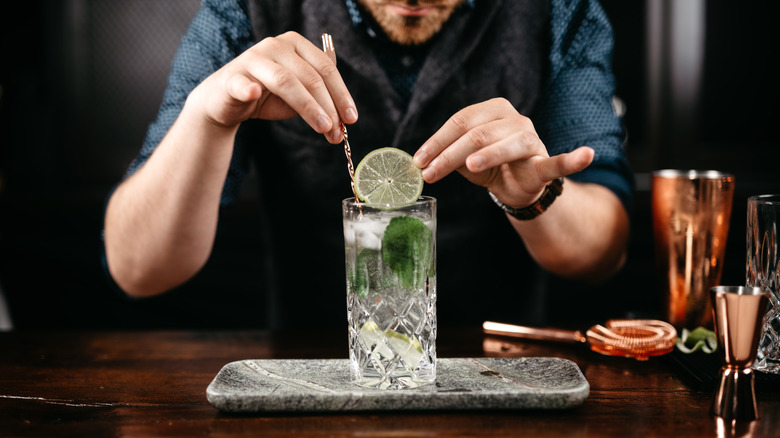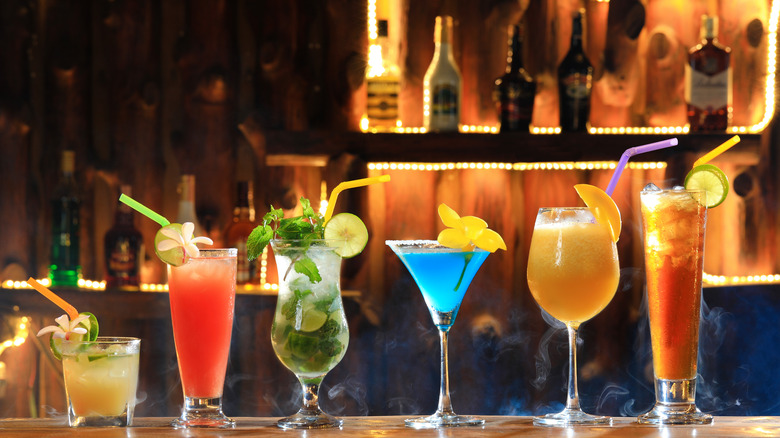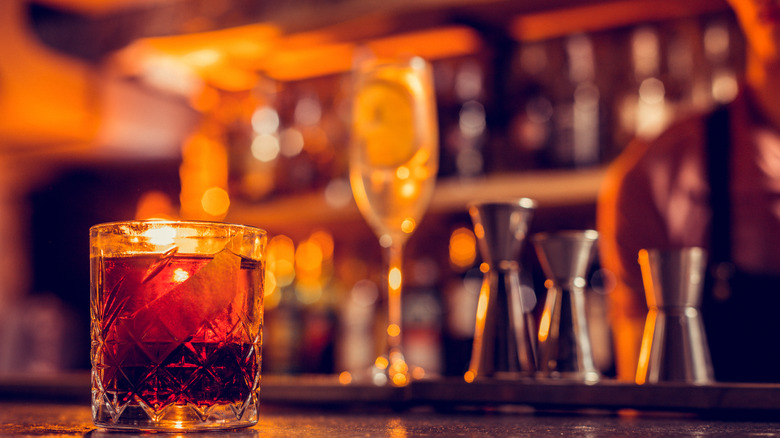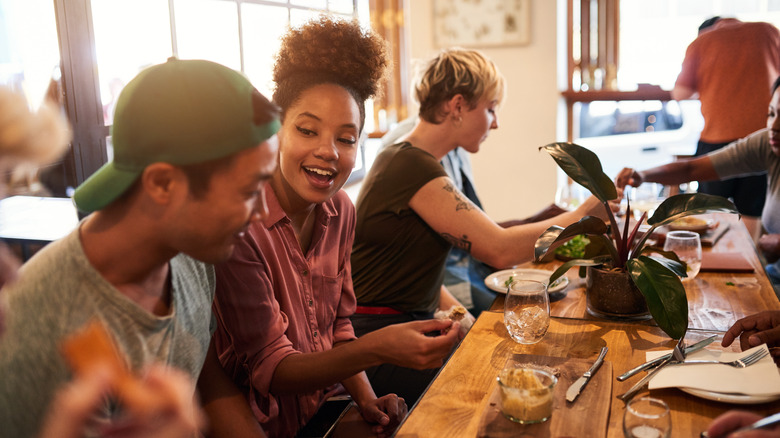The Truth About Booze-Free Bars
As more and more people are getting their COVID shots, thoughts are turning to other kinds of shots. Namely, the kind you get in a bar. After a year of limited human to human interaction, the idea of returning to social norms like meeting friends for a drink at the local mixology spot is on the horizon again. But what about those who don't drink?
While it's true that movie theaters and restaurants are also opening, sometimes you just want to go to a bar and have a good non-alcoholic drink (i.e. not a basic soda). Luckily, there are bars designed just for that, and before you judge, they're anything but boring. In fact, in some areas they're quite profitable, appealing to a wide demographic of social drink appreciators, from recovering alcoholics to individuals who don't drink for religious, personal, or health reasons (via Eater). In fact, even those who enjoy a tipple might find a reason to stop in, for instance as a fun first date spot where you don't have to worry about alcohol clouding your conversations or first impressions. However, you might be surprised to learn how these bars first came about.
How non-alcoholic bars first started
This new wave of non-alcoholic bars isn't just catering to recovering alcoholics, although in some instances that is how they began. For instance, back in 2013, a sober bar called The Other Side opened in Chicago to cater to members of the community who were in recovery (via Eater). However, it didn't just serve drinks, you could also go there to play video games or pool or even to listen to live music! The bar is still open, and also hosts family support meetings as well as open AA meetings (via The Other Side).
Of course, it's not just those in recovery who are raving about these non-alcoholic spots. In fact, the trend is fully international at this point, thanks in part to the "dry January" trend on social media and the number of people who are limiting their alcoholic intake for health reasons (via Eater). London already has several bars and restaurants catering to teetotalers with extensive menus of both non-alcoholic and low-alcohol mixology drinks to choose from in addition to the traditional alcoholic drink menus (via Time Out). As Traveller reports, if you're looking for a cozy library, bustling hotel bar, or even a Mexican restaurant with upgraded non-alcoholic options, you can find it. But what can you expect once you're there?
What to expect from a non-alcoholic bar
If you're expecting these non-alcoholic bars to serve seltzer and soda, think again. The new wave of booze-free bars is growing popular, at least in part because of the talent and innovation of mixologists. Head to a spot like Vena's Fizz House in Downtown Portland, Maine and you can expect to find some truly unique ingredients, from pear purée and coconut cream to ghost pepper and homemade bitters in your drinks (via Eater). The atmosphere is designed to feel like an old-school soda shop, and downstairs you can pick up the ingredients needed to make some tasty non-alcoholic cocktails at home.
However, if you're hoping the lack of alcohol means these drinks will be cheaper, you'd be mistaken. It's true, if you're ordering a seltzer with lime instead of a cocktail you'll definitely end up spending less on happy hour than your alcohol-drinking compatriots. However, a real non-alcoholic mixology drink is a different story and can still cost a pretty penny. The reason? High-quality ingredients cost money to create, just like alcohol. Whether you're sipping tobacco syrup, lingonberry juice, or specialty seltzers, you're paying for an experience — just not a boozy one (via The Manual).
The future of non-alcoholic mixology
The recent rise in popularity of non-alcoholic drinks and bars has already had a palpable effect on bar culture. While some once-alcohol-free bars are adding alcohol to their menus in order to appeal to a wider demographic, alcohol-serving bars are similarly upping their mocktail menus to keep up with demand. The combination effect is ideal for those who aren't willing to give up going to the bar but don't necessarily want it known that they aren't drinking alcohol.
This might even see the rise of a new kind of bar culture that's less focused on getting buzzed, as new communities are discovering the non-alcoholic bar option for the first time. These include individuals of the Mormon and Muslim faiths who don't drink for religious reasons, some of whom even travel across state lines to experience these institutions when none exist nearby, showing there is still in demand for these kinds of spaces even as more and more appear (via Eater). For now, at least, it seems like the trend is showing no signs of stopping.
If you, or anyone you know, is struggling with addiction issues, help is available. Visit the Substance Abuse and Mental Health Services Administration (SAMHSA) website or contact SAMHSA's National Helpline at 1-800-662-HELP (4357).



